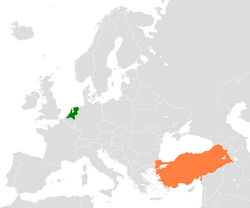2017 Dutch–Turkish diplomatic incident
 |
|
|
Netherlands |
Turkey |
|---|---|
Turkish constitutional referendum Sunday, 16 April 2017 |
|
|---|---|
| Campaigns | |
|
|
|
|
Choices ordered according to colour and layout of ballot paper
|
|
In March 2017, the Netherlands and Turkey were involved in a diplomatic incident, triggered by Turkish efforts to hold political rallies on Dutch territory and subsequent travel restrictions placed by Dutch authorities on Turkish officials seeking to promote the campaign for a 'yes' vote in the upcoming Turkish constitutional referendum to Turkish citizens living in the Netherlands. Such foreign campaigning is illegal under Turkish law.
The Netherlands barred the aircraft of Turkish Minister of Foreign Affairs Mevlüt Çavuşoğlu from landing, and expelled Turkish Minister of Family and Social Policies, Fatma Betül Sayan Kaya from the country, when both tried to speak at rallies. In response, Turkey expelled the Dutch ambassador from the country, and Turkish President Recep Tayyip Erdoğan called the Dutch "fascists" and "remnants of Nazism" and accused the Netherlands of "massacring" Muslims in Srebrenica during the Bosnian War in 1995. Dutch Prime Minister Mark Rutte called Erdoğan's remarks "unacceptable" and a "vile falsification of history" and demanded an apology. Rutte also called for talks to resolve the impasse, adding that Turkey had crossed a diplomatic line.
The Turkish referendum held on 16 April 2017 concerned a series of constitutional amendments that, if approved, would transform the country from a parliamentary democracy into a presidential system, under which President Erdoğan would be able to stand in two more elections, theoretically allowing him to govern as a powerful head of state until 2029. Critics of the proposed changes have expressed their fears of increased authoritarianism, whereas supporters claim the new system would make the Turkish state stronger and safer.
...
Wikipedia
